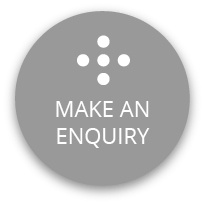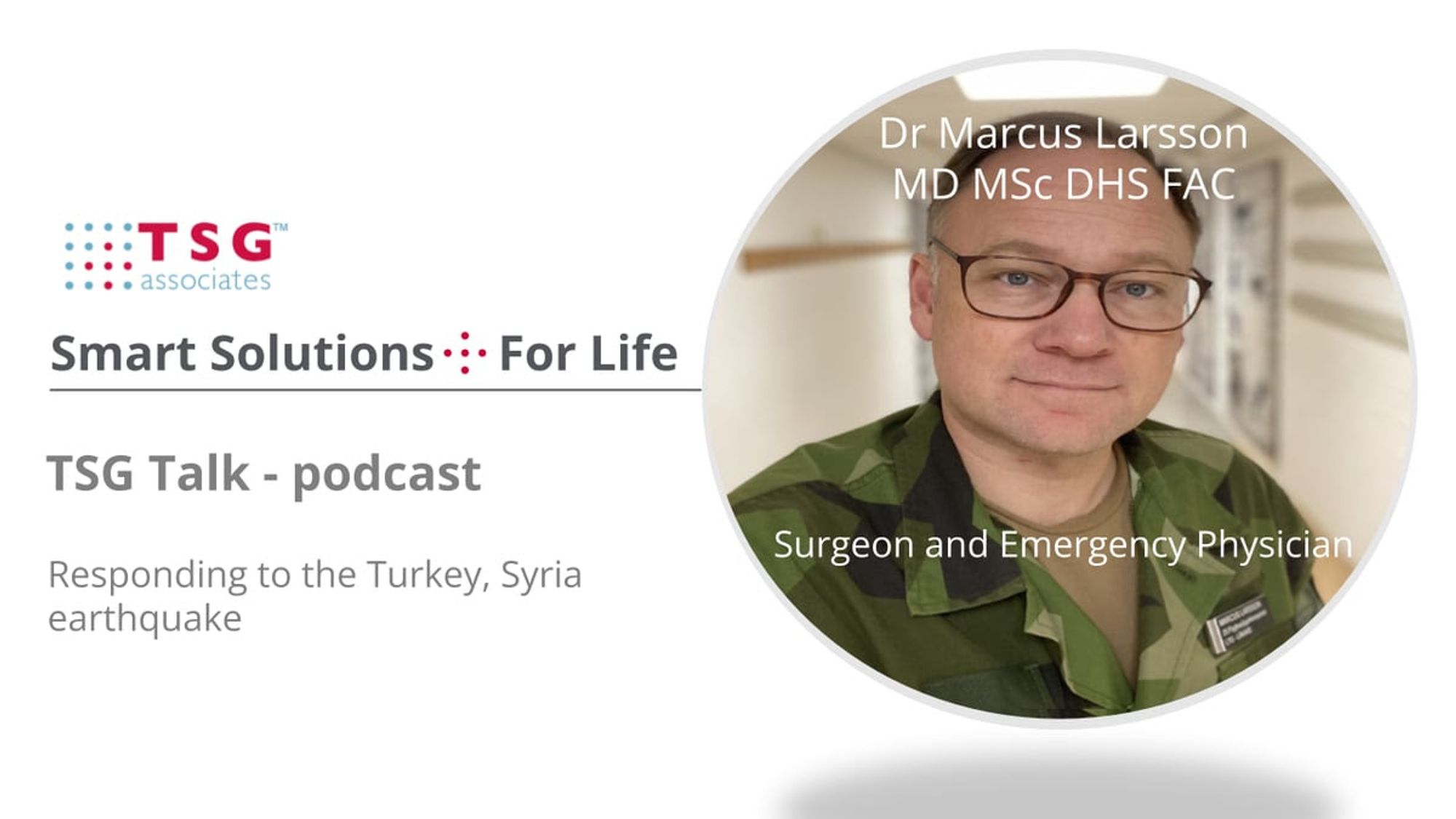


28/03/2024
TSG Talk- Delivering medical aid to the Turkey/Syria earthquakes
During this episode, Colin Smart, our Senior Partner, had a conversation with Dr. Marcus Larsson about his essential role in providing medical aid during the Turkey-Syria earthquakes. They discussed the challenges that were posed by the damaged infrastructure and winter storms, and how these factors influenced the relief efforts on the ground.

Marcus’s background
Marcus first explained his medical background and how he came to be deployed to Turkey.
“I’m 51, husband, father of two and spend lots of my spare time scouting with the Swedish scout organisation. Professionally, I'm an emergency physician and general surgeon. I've worked in many different climates over the years, I've worked in temperate Sweden, subarctic Sweden, Greenland and then the UAE to get some desert experience. I’ve also worked clinically in some different managerial positions, head of departments and such. I'm really interested in physical medicine. I have a diploma in Alpine medicine, and environmental injuries and diseases are what get me going. That's why I got involved in the Swedish Armed Forces and I now belong to the Swedish Air Force Ranger Company, where we are developing what we call Air Force SRT Surgical resuscitation team. It’s a three-man team which has been operating for almost a year. We're constantly developing, and it's very stimulating, we're creating something new and dynamic, and it's lots of fun. It's within this scope that we were deployed to Turkey in January this year.”
He proceeded to specify the capabilities of his team.
“We were asked by the Swedish Civil Contingencies Agency, who were going to deploy with some rescue experts if we could support them with a medical team and search dogs. So, because our unit does personnel recovery, we have trained dogs for finding people lost in the woods or hiding in the woods. We didn't know how they would respond to a disaster area after an earthquake, with the rubble and the collapsed buildings. But they were available, we could offer a one package solution of dogs and help care. So, we were deployed, and we also had a unit from an engineering regiment who had these big drills and concrete saws and endoscopes to look into rubble, lots of kit. We were approximately 70 people.”
Situation on arrival
Marcus then discussed his arrival in Turkey.
“When we arrived, it was a complete disaster. A great deal of all the buildings were completely destroyed. High rises were lying about like a deck of cards. Roads were obstructed, and people were everywhere. It was quite overwhelming when we got there and saw the scale of it. There were lots of people involved, and many were injured. This happened on a Monday and then we got the call Tuesday evening. We mobilised on Wednesday, and we flew out on Thursday. So, we arrived on day 3-4 to the area, by then, the proverbial dust had started to settle, and we talked to some other nations who had deployed. They told us that initially there was a lot of crush injuries. There was a lot of trauma and an insane amount of fractures, large and small. They had to do some in-field amputations because of entrapped people and so on to get them out. When we got out and about, we had sort of passed that phase. And the ones that we participated in rescuing, they were not that badly injured because if you were badly injured and trapped on day four, you were dead more or less. “
Camping conditions
Marcus then described the challenges of camping in Turkey after an earthquake.
“I remember very well the first night we spent in the field. We were on a rise, across the valley from the city itself, at Caraman Marsh, which was very close to the epicentre. The city is on the slope of a long mountain, we were grouped together with lots of other foreign aid agencies, militaries, civilian organisation on the other side of the valley. We could see the whole city in front of us. The first night it was almost completely dark. The only lights in the city were searchlights from excavators and trucks. But each consecutive night there were some more lights, and some electricity came back. The last night we were there, we were back up and running again. But when we came, there was nothing. Nothing was working, no water, no lights, no electricity. So that was very interesting, quite challenging. We were allocated to a campsite together with other agencies, as I said. There was one by Afad, which is Turkish disaster management. We were assigned a square plot of gravel where we had to set up and there was also no infrastructure support. There was water and there was gasoline available at certain times per day. We had deployed as we usually do, since we are a highly mobile light ranger unit with our normal equipment, patrol tents, backpacks and so on, which was not very well suited for setting up a more permanent camp with our objective to support and assist the rescue efforts.”
He explained how temperature issues with their medical equipment were resolved in an unorthodox way.
“It was -12°C, -15°C at night. As I said, we are light and mobile, we don't bring heaters, we don't bring generators. What was really helpful was that we had three Toyota land cruisers that we brought from Sweden. By using them, we could generate electricity and heat for some sensitive equipment and, not the least, medication. We were very concerned that our ampules would freeze and crack and that our IV fluids would freeze because going below -10°C is actually a risk. So, it was a lifesaver to have those vehicles available, to have one on idle all night keeping things warm. But then we got resupplied and we were able to extend our camp. We got the heaters and generators and life significantly improved. But setting up a campsite without support, we had to figure out how to solve hygiene, sanitation, all those things. “
What's the one piece of medical equipment you would never be without?
Marcus then described why POX was his equipment of choice.
“I think It would be the POX, It’s not perfect, it has its pitfalls. But if you cannot bring a big monitor or if you don’t have that many people, it gives you a quick overview of the patient, it gives you a rough estimate of how your resus is going. I think that’s what I would bring. But then since I’m a hypothermia nerd, I might bring the fluid warmer, especially the new one I have. It makes such a big difference for a hypothermia patient.”
Find out more
Click here to listen to the full TSG Talk episode with Dr. Marcus Larsson, and to find out more about our life-saving solutions please call TSG Associates on 01422 557841 or email the team at @info@tsgassociates.


%201.png)






